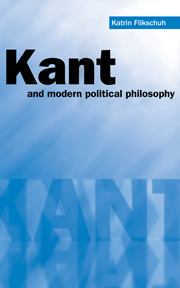Book contents
- Frontmatter
- Contents
- Acknowledgements
- List of Kant's works and abbreviations
- Introduction
- 1 Kantian metaphysics in contemporary liberalism
- 2 The metaphysics of freedom as an idea of reason
- 3 The morality of external freedom
- 4 The Lex Permissiva: property rights and political obligation in the Rechtslehre
- 5 The general united will and cosmopolitan Right
- 6 The metaphysics of Kant's cosmopolitanism
- Select bibliography
- Index
6 - The metaphysics of Kant's cosmopolitanism
Published online by Cambridge University Press: 22 September 2009
- Frontmatter
- Contents
- Acknowledgements
- List of Kant's works and abbreviations
- Introduction
- 1 Kantian metaphysics in contemporary liberalism
- 2 The metaphysics of freedom as an idea of reason
- 3 The morality of external freedom
- 4 The Lex Permissiva: property rights and political obligation in the Rechtslehre
- 5 The general united will and cosmopolitan Right
- 6 The metaphysics of Kant's cosmopolitanism
- Select bibliography
- Index
Summary
Since the earth's surface is not unlimited but closed, the concepts of the Right of a state and of a Right of nations lead inevitably to the Idea of a Right for all nations (ius gentium) or cosmopolitan Right (ius cosmopoliticum). So if the principle of outer freedom limited by law is lacking in any of these three possible forms of rightful condition, the framework of all others is unavoidably undermined and must finally collapse.
(RL, 6: 311)But the rule for this [cosmopolitan] constitution, as a norm for others, cannot be derived from the experience of those who have hitherto found it most to their advantage … it certainly requires a metaphysics. Even those who ridicule metaphysics admit its necessity, though carelessly, when they say, for example, as they often do: ‘the best constitution is that in which power belongs not to men but to law’. For what can be more metaphysically sublimated than this very Idea?’
(RL, 6: 355)INTRODUCTION
Over the course of the last two chapters I have argued that both he justification of individual property rights and the account of individuals' ensuing obligations of justice are broached by Kant from a cosmopolitan perspective which includes as subjects of Right all those who because they cannot avoid occupying a place on the earth, claim a right to such a place.
- Type
- Chapter
- Information
- Kant and Modern Political Philosophy , pp. 179 - 205Publisher: Cambridge University PressPrint publication year: 2000



